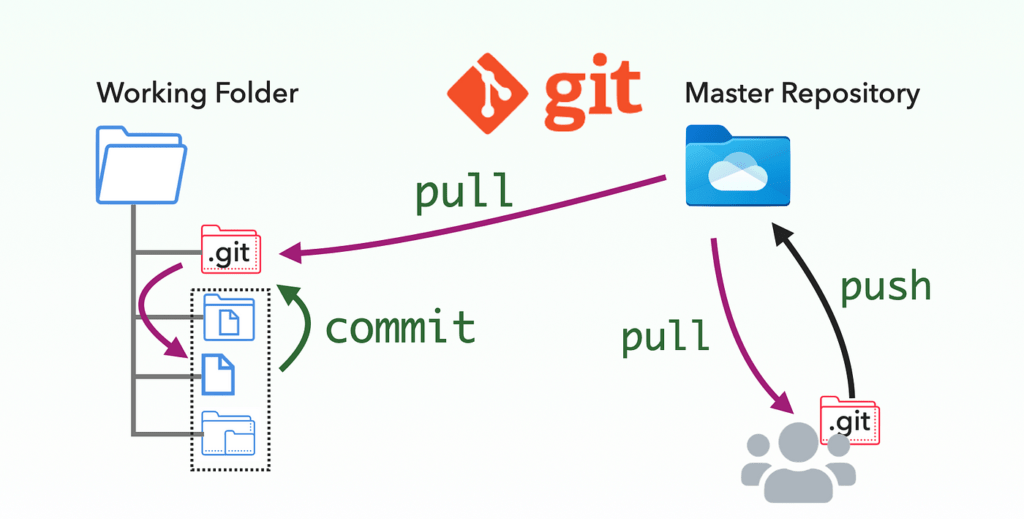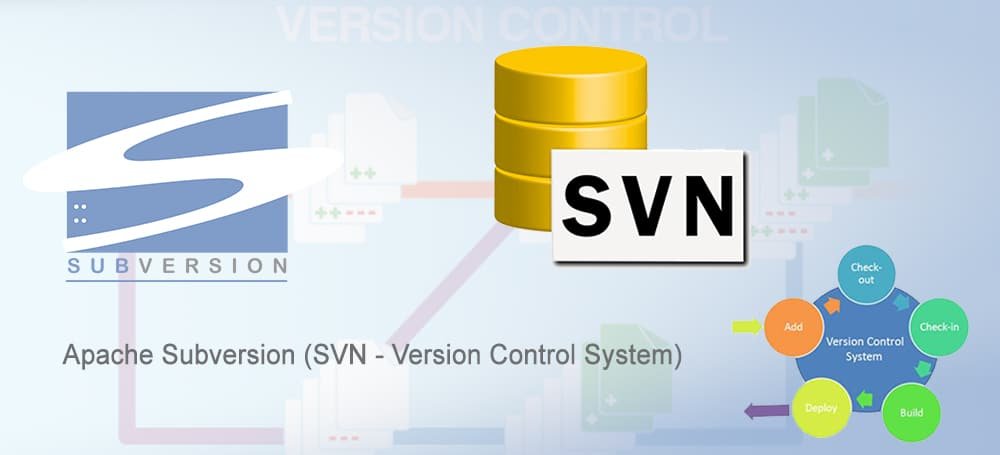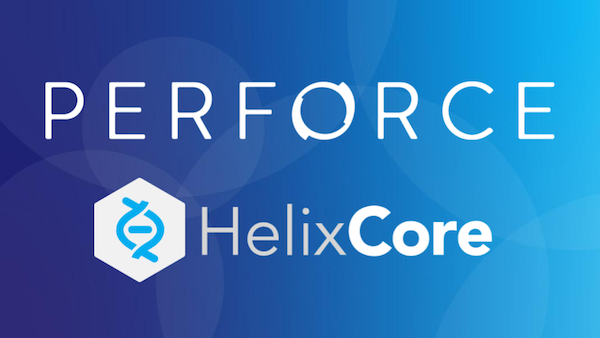
A version control system is a software tool that helps software teams manage changes to source code over time.
You can use version control to version code, binaries and digital assets.
For more information, we recommend you to review our article titled What is a Version Control System?
In this article, we have examined the 10 most known and used version control systems in detail.
1. Git

Git is one of the best version control tools available in the current market.
Featured Features
- Provides strong support for non-linear development.
- It offers a distributed repository model.
- Compatible with existing systems and protocols such as HTTP, FTP, ssh.
- It can handle small and large scale projects efficiently.
- It can perform cryptographic authentication.
- Offers useful merge strategies.
- It makes toolkits available.
- Offers periodic open object packaging options.
- Garbage accumulates until it is collected.
Pros
- Super fast and efficient performance.
- Cross platform support.
- Code changes can be tracked very cleanly and easily.
- It is easy to maintain and robust.
- It offers a great command line utility known as git bash.
- It also offers GIT GUI where you can very quickly rescan, change status, logout, approve, and submit code quickly in just a few clicks.
Cons
- Complex and larger history logs become difficult to understand.
- Does not support keyword expansion and timestamp protection.
Open Source : Yes
Price : Free of charge.
Website : https://git-scm.com/
2. CVS
It is also the most popular revision control system. CVS has been the tool of choice for a long time.
Featured Features
- It works with client-server architecture.
- Multiple developers can work on the same project in parallel.
- The CVS client keeps the working copy of the file up-to-date and only requires manual intervention when an edit conflict occurs
- Keeps a historical snapshot of the project.
- Can provide anonymous read access.
- It has an “Update” command to keep local copies up to date.
- Can support different branches of a project.
- Excludes symbolic links to avoid security risk.
- Uses delta compression technique for efficient storage.
Pros
- It offers excellent cross-platform support.
- Robust and full-featured command line client allows powerful scripting
- It is easy to get support from the large CVS community.
- It allows a good web crawl of the source code repository.
- It is a very old, well known and understood tool.
- It fits perfectly with the collaborative nature of the open source world.
Cons
- No integrity checks for the source code repository.
- Does not support atomic checks and commits.
- Poor support for distributed source control.
- Does not support signed revisions and merge tracking.
Open Source : Yes
Price : Free of charge.
Website : https://savannah.nongnu.org/projects/cvs
3. SVN

Apache Subversion, abbreviated as SVN, is the most suitable competitor to the widely used CVS tool we just discussed above.
Featured Features
- Offers a client-server repository model.Indexes can be versioned.
- Copy, delete, move and rename operations are also versioned.
- Supports atomic comites.
- Supports free-form versioned metadata.
- Provides versioned symbolic links.
- Offers space efficient binary diff storage.
- Branching does not depend on file size and this is an inexpensive operation.
- Supports many features such as merge tracking, full MIME support, path-based authorization, file locking, independent server operation
Pros
- It has the advantage of good GUI tools like TortoiseSVN.
- Supports empty directories.
- It has better Windows support compared to Git.
- Easy to install and manage.
- Integrates well with Windows, the leading IDE and Agile tools.
Cons
- Does not store the modification time of files.
- Does not deal well with file name normalization.
- Does not support signed revisions.
Open Source : Yes
Price : Free of charge.
Website : https://subversion.apache.org/
4. Mercurial
Mercurial is a distributed revision control tool for software developers written in python. The operating systems it supports are Unix-like, Windows and macOS.
Featured Features
- High performance and scalability.Advanced branching and joining capabilities.
- Fully distributed collaborative development.
- Decentralized.
- Robustly handles both plain text and binary files.
- It has an integrated web interface.
Pros
- Fast and powerful.
- Easy to learn.
- Flexible and lightweight.
- It is very easy to learn.
Cons
- All plugins must be written in Python.
- Partial checkouts are not allowed.
- Very problematic when used with additional extensions.
Open Source : Yes
Price : Free of charge.
Website : https://www.mercurial-scm.org/
5. Monotone
Monotone, written in C++, is a tool for distributed revision control. The operating system it supports includes Unix, Linux, BSD, Mac OS X and Windows.
Featured Features
- Provides good support for internationalization and localization.
- Focuses on integrity rather than performance.Designed for distributed transactions.
- Uses cryptographic primitives to track file revisions and authentications.
- It can import CVS projects.
- It uses a very efficient and robust proprietary protocol called Netsync.
Pros
- Very low maintenance.
- Well documented.
- Easy to learn.
- It has a flexible design.
- Branching and merging capabilities are powerful.
- It offers a stable GUI.
Cons
- Experiences observed performance issues for some transactions.
- No transactions or payments can be made from behind the proxy.
Open Source : Yes
Price : Free of charge.
Website : https://www.monotone.ca/
6. Bazaar

Bazaar is a version control tool based on a distributed and client-server pool model. It provides cross-platform operating system support and is written in Python 2, Pyrex and C.
Featured Features
- It has commands similar to SVN or CVS.
- Allows you to work with or without a central server.
- Provide free hosting services through the Launchpad and Sourceforge websitesSupports file names in the entire Unicode set.
Pros
- Index tracking is very well supported in Bazaar (tools like Git, Mercurial, etc. do not have this feature)
- The plug-in system is very easy to use.
- It provides high storage efficiency and speed.
Cons
- Does not support partial checkout/clone.
- Does not provide timestamp protection.
Open Source : Yes
Price : Free of charge.
Website : http://bazaar.canonical.com/en/
7. TFS
TFS, short for Team Foundation Server, is a version control product from Microsoft. It is based on a client-server, distributed repository model and has a special license. It provides Windows, cross-platform operating system support through Visual Studio Team Services (VSTS).
Featured Features
- It provides full application lifecycle support including source code management, project management, reporting, automated builds, testing, release management and requirements management.
- DevOps capabilities are enhanced.
- Can be used as a backend for several IDEs.
- Available in two different formats (on-premises and online (known as VSTS)).
Pros
- Easy administration. Familiar interfaces and tight integration with other Microsoft products.
- Allows continuous integration, teaming and unit testing integration.
- Provides large stacks for branching and merging.
- Offers custom return policies to help implement a fixed and stable code base in your source control.
Cons
- Frequent merge conflicts.
- Connection to the central warehouse is always required.
- Very slow for pulling, returning and branching.
Open Source : No
Price : Up to 5 users on VSTS is free. The server license can be purchased for about $500 and client licenses are about the same.
Website : https://www.visualstudio.com/tfs/
8. VSTS
VSTS (Visual Studio Team Services) is a distributed, client-server repository model based version control tool provided by Microsoft. It follows the Merge or Lock concurrency model and provides cross-platform support.
Featured Features
- Programming Language: C# and C++
- Provides a method of changeset storage.
- File and Tree change coverage.
- SOAP over HTTP or HTTPS, and Ssh support.
- VSTS offers flexible build capabilities through build hosting on Microsoft Azure.It offers DevOps support.
Pros
- All the features available in TFS are available in VSTS in the cloud.
- It supports almost every programming language.
- It has a simple user interface.
- Updates are installed automatically.
- Provides git access.
Cons
- Signed revisions are not allowed.
- The “Work” section is not very well optimized for large teams.
Open Source : No
Price : Free for up to 5 users. 30 US dollars per month for 10 users.
Website : https://www.visualstudio.com/team-services/
9. Perforce Helix Core

Helix Core is a Client-server and distributed revision control tool developed by Performance Software Inc. It supports Unix-like, Windows and OS X platforms. This tool is mainly meant for large-scale development environments.
Featured Features
- Provides a centralized database and a master repository for file versions.
- Supports all file types and sizes.
- Provides file-level asset management.
- Maintains a single source of truth.
- Provides flexible branching.
- Provides DevOps support.
Pros
- Git is accessible.
- It is very fast
- It is flexible.
- It is easy to track the list of changes.
- Diff tools make it very easy to identify code changes.
- Works well with visual studio via plugin.
Cons
- Managing multiple workspaces is quite difficult.
- Rollback changes are cumbersome if they are split across multiple changelists.
Open Source : No, it is proprietary software. However, a 30-day free trial is available.
Price : Helix Core is now always free for up to 5 users and 20 workspaces.
Website : https://www.perforce.com/products/helix-core
10. IBM Rational ClearCase
ClearCase by IBM Rational is a client-server pool model based on a software configuration management tool. It supports many Operating systems including AIX, Windows, z/OS (limited client), HP-UX, Linux, Linux on z Systems, Solaris.
Featured Features
- It supports two models, UCM and base ClearCase.
- UCM stands for Unified Change Management and provides an out-of-the-box model.
- Base ClearCase offers basic infrastructure.
- It is capable of handling large binaries, large numbers of files and large repository sizes.
- It allows branching, tagging and versioning of directories.
Pros
- It offers a simple UI.Integrates with Visual Studio.
- Manages parallel development.
- ClearCase Views is very convenient as it allows switching between projects and configurations, unlike the native workstation model of other version control tools.
Cons
- It has slow recursive operations.
- Two files with the same name are added to the location instead of creating versions for the same file.
- There is no advanced API.
Open Source : No, it is a proprietary tool. However, a free trial version is available.
Price : 4600$ license fee.
Website : https://www.ibm.com/in-en/marketplace/rational-clearcase
Conclusion
As we have seen, each tool has its own distinctive features, pros and cons. Some are open source tools, others are paid. Some are suitable for the small business model, while others are suitable for the large business model.
Therefore, you need to choose the right tool as per your requirements after weighing the pros and cons. For paid tools, we recommend checking out the free trial versions before buying.